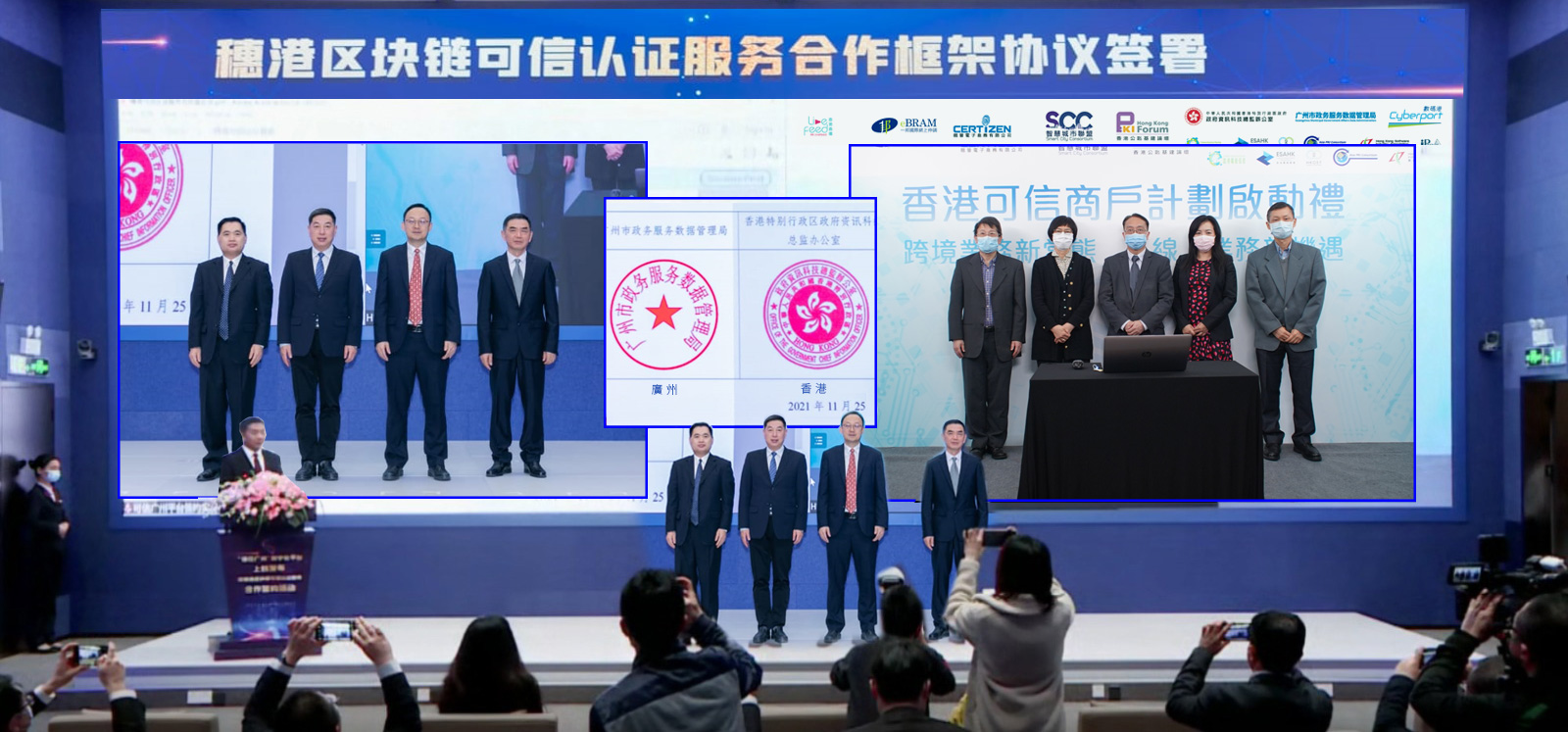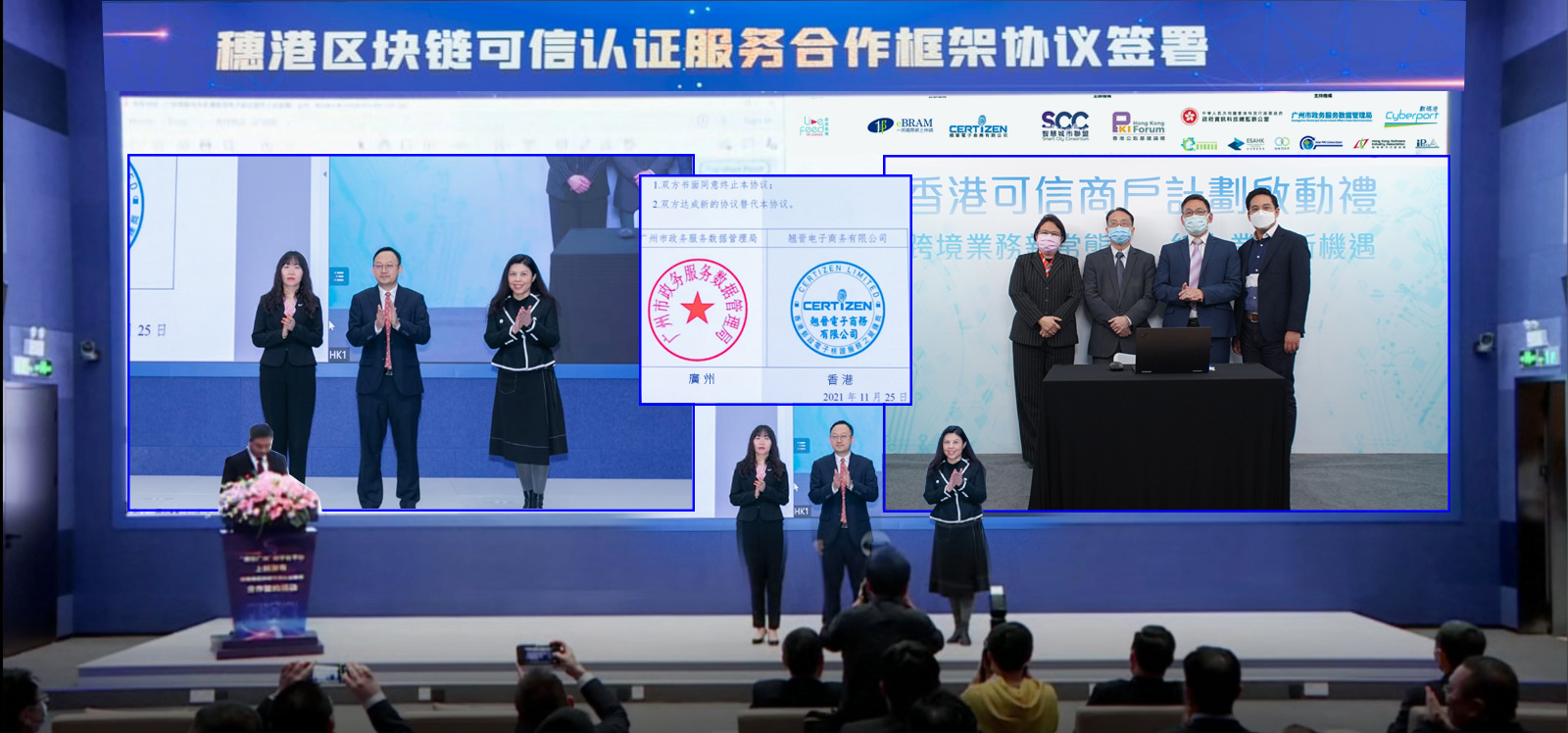(25 Nov 2021) The Hong Kong Public Key Infrastructure Forum and the Smart City Consortium have jointly announced the launch of the 'Hong Kong Trusted Merchant Program' (香港可信商戶計劃). With technical support from Certizen Limited, the operator of Hongkong Post e-Cert, and eBRAM International Online Dispute Resolution Centre, this program utilizes Hong Kong's digital infrastructure to help enterprises capitalize on opportunities in the online business landscape. A virtual grand ceremony marked the launch, gathering industry experts to share valuable insights on the subject and facilitating enriching, interactive exchanges with relevant counterparts in Guangzhou.
During the inauguration of the "Hong Kong Trusted Merchant Program", Mr. Jason Pun, Assistant Government Chief Information Officer (Governance & Resources), highlighted the long-standing collaboration between the Hong Kong and Guangdong Province governments. He emphasized the establishment of the "Guangdong-Hong Kong Working Group on Pilot Applications of Mutual Recognition of Electronic Signature Certificates" in 2008, a significant initiative aimed at leveraging technology to stimulate cross-border business growth within a legally safeguarded framework.

Over the years, numerous pilot programs have been implemented, including the establishment of a "Cross-Border Electronic Customs Clearance Platform" and the issuance of mutual recognition certificates through remote, non-face-to-face methods. These initiatives have facilitated projects like "remote securities account opening". The Office of the Government Chief Information Officer envisions the mutual recognition of Guangdong-Hong Kong electronic signature certificates as a cornerstone for building a trusted certification service ecosystem between Guangdong and Hong Kong, ultimately enhancing public services, improving the business environment, and promoting seamless connectivity of information infrastructure.

The participating entities from both areas have embraced digital transformation and signed a cooperative agreement in an electronic cross-border format. The signatories of this agreement included the Office of the Government Chief Information Officer of the Hong Kong Special Administrative Region, the Guangzhou Municipal Government Affairs Data Administration, and Certizen Limited, the operator of Hongkong Post e-Cert. This collaboration aims to pave the way for the development of online access to municipal services in Guangzhou, catering to the needs of Hong Kong citizens and institutions. It marks a significant milestone in the journey towards establishing seamless integration within the Greater Bay Area and holds promising prospects for potential expansion to other cities in the future.
Mr. Gary Yeung, President of the Smart City Consortium, emphasized that the Consortium has actively championed the use of online trusted identity solutions during the pandemic. This includes advocating for the use of electronic signatures for virus testing certificates and integrating with travel certification programs in various regions to ensure the continuity of economic activities. The launch of the "Hong Kong Trusted Merchant Program" is a further step towards assisting businesses and organizations in leveraging online trusted identities to capitalize on opportunities in both domestic and international online business ventures. With the advancement of smart city development, the roll-out of digital infrastructure is gaining momentum across different regions. This technological progress is set to facilitate the seamless integration of human mobility, logistics, capital flow, and information exchange, promoting the growth of smart city clusters within the Greater Bay Area. The advent of this technology will not only enhance the convenience of cross-border business but also offer a diverse range of applications where merchants are capable of managing government services, applying for subsidies, signing contracts, and much more, all through online platforms.

On the international level, Mr. William Gee, Vice-Chairman of Asia PKI Consortium, highlighted the paramount importance of ensuring the authenticity of online identities, especially when it involves institutions from different legal jurisdictions in online transactions and contract signings. Institutions should utilize the internationally recognized Legal Entity Identifier (LEI) system to verify their identities and establish credibility and authorization. The LEI code, based on the ISO 17442 standard developed by the International Organization for Standardization (ISO), serves as the "international internet identity certificate" for businesses and institutions, offering a universally accepted means of entity identification. It is a result of the efforts supported by the Group of G20, the Financial Stability Board, and many regulators around the world.
Ms. Emmanuelle Ta, Chief Executive Officer of eBRAM International Online Dispute Resolution Centre, encouraged merchants to utilize online dispute resolution services optimally for safeguarding cross-border online transactions. Through online mediation and arbitration, disputes can be resolved more efficiently and cost-effectively. She emphasized that eBRAM is committed to integrating cutting-edge technologies to meet the growing demand for cross-border dispute resolution services, solidifying Hong Kong as a pivotal centre for dispute resolution and LawTech. In her keynote speech, she highlighted how eBRAM leverages advanced technologies like blockchain, artificial intelligence, and cloud computing to support the online dispute resolution (ODR) platform. She also underscored eBRAM's stringent commitment to cybersecurity and data privacy, employing top-tier security technology to ensure the protection of the eBRAM platform and the data processed within it.
Ms. Eva Chan, Chairman of the Hong Kong Public Key Infrastructure Forum, elaborated that each institution involved in the "Hong Kong Trusted Merchant Program" is obliged to undergo an annual identity verification process conducted by an authorized entity. In case of any detected non-compliance, the institution's online identity and electronic signatures would be promptly revoked under legal protocols, ensuring the safety of online transactions. Further, Ms. Emmanuelle Ta, CEO of the eBRAM International Online Dispute Resolution Centre, highlighted that Hong Kong boasts significant professional prowess in online dispute resolution services. In the event of any disputes during the process, the centre is dedicated to providing participating institutions with a convenient and cost-effective one-stop online dispute resolution service.


